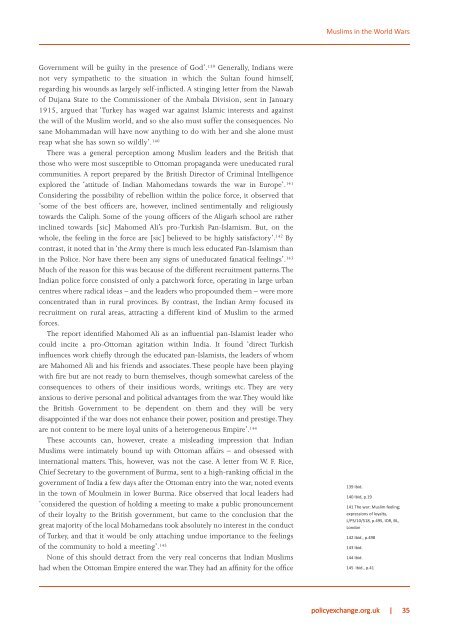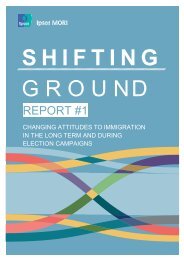You also want an ePaper? Increase the reach of your titles
YUMPU automatically turns print PDFs into web optimized ePapers that Google loves.
Government will be guilty in the presence of God’. 139 Generally, Indians were<br />
not very sympathetic to the situation in which the Sultan found himself,<br />
regarding his wounds as largely self-inflicted. A stinging letter from the Nawab<br />
of Dujana State to the Commissioner of the Ambala Division, sent in January<br />
1915, argued <strong>that</strong> ‘Turkey has waged war against Islamic interests and against<br />
the will of the Muslim world, and so she also must suffer the consequences. No<br />
sane Mohammadan will have now anything to do with her and she alone must<br />
reap what she has sown so wildly’. 140<br />
There was a general perception among Muslim leaders and the British <strong>that</strong><br />
those who were most susceptible to Ottoman propaganda were uneducated rural<br />
communi<strong>ties</strong>. A report prepared by the British Director of Criminal Intelligence<br />
explored the ‘attitude of Indian Mahomedans towards the war in Europe’. 141<br />
Considering the possibility of rebellion within the police force, it observed <strong>that</strong><br />
‘some of the best officers are, however, inclined sentimentally and religiously<br />
towards the Caliph. Some of the young officers of the Aligarh school are rather<br />
inclined towards [sic] Mahomed Ali’s pro-Turkish Pan-Islamism. But, on the<br />
whole, the feeling in the force are [sic] believed to be highly satisfactory’. 142 By<br />
contrast, it noted <strong>that</strong> in ‘the Army there is much less educated Pan-Islamism than<br />
in the Police. Nor have there been any signs of uneducated fanatical feelings’. 143<br />
Much of the reason for this was because of the different recruitment patterns. The<br />
Indian police force consisted of only a patchwork force, operating in large urban<br />
centres where radical ideas – and the leaders who propounded them – were more<br />
concentrated than in rural provinces. By contrast, the Indian Army focused its<br />
recruitment on rural areas, attracting a different kind of Muslim to the armed<br />
forces.<br />
The report identified Mahomed Ali as an influential pan-Islamist leader who<br />
could incite a pro-Ottoman agitation within India. It found ‘direct Turkish<br />
influences work chiefly through the educated pan-Islamists, the leaders of whom<br />
are Mahomed Ali and his friends and associates. These people have been playing<br />
with fire but are not ready to burn themselves, though somewhat careless of the<br />
consequences to others of their insidious words, writings etc. They are very<br />
anxious to derive personal and political advantages from the war. They would like<br />
the British Government to be dependent on them and they will be very<br />
disappointed if the war does not enhance their power, position and prestige. They<br />
are not content to be mere loyal units of a heterogeneous Empire’. 144<br />
These accounts can, however, create a misleading impression <strong>that</strong> Indian<br />
Muslims were intimately bound up with Ottoman affairs – and obsessed with<br />
international matters. This, however, was not the case. A letter from W. F. Rice,<br />
Chief Secretary to the government of Burma, sent to a high-ranking official in the<br />
government of India a few days after the Ottoman entry into the war, noted events<br />
in the town of Moulmein in lower Burma. Rice observed <strong>that</strong> local leaders had<br />
‘considered the question of holding a meeting to make a public pronouncement<br />
of their loyalty to the British government, but came to the conclusion <strong>that</strong> the<br />
great majority of the local Mohamedans took absolutely no interest in the conduct<br />
of Turkey, and <strong>that</strong> it would be only attaching undue importance to the feelings<br />
of the community to hold a meeting’. 145<br />
None of this should detract from the very real concerns <strong>that</strong> Indian Muslims<br />
had when the Ottoman Empire entered the war. They had an affinity for the office<br />
Muslims in the World Wars<br />
139 Ibid.<br />
140 Ibid, p.19<br />
141 The war: Muslim feeling;<br />
expressions of loyalty,<br />
L/PS/10/518, p.495, IOR, BL,<br />
London<br />
142 Ibid., p.498<br />
143 Ibid.<br />
144 Ibid.<br />
145 Ibid., p.41<br />
policyexchange.org.uk | 35



